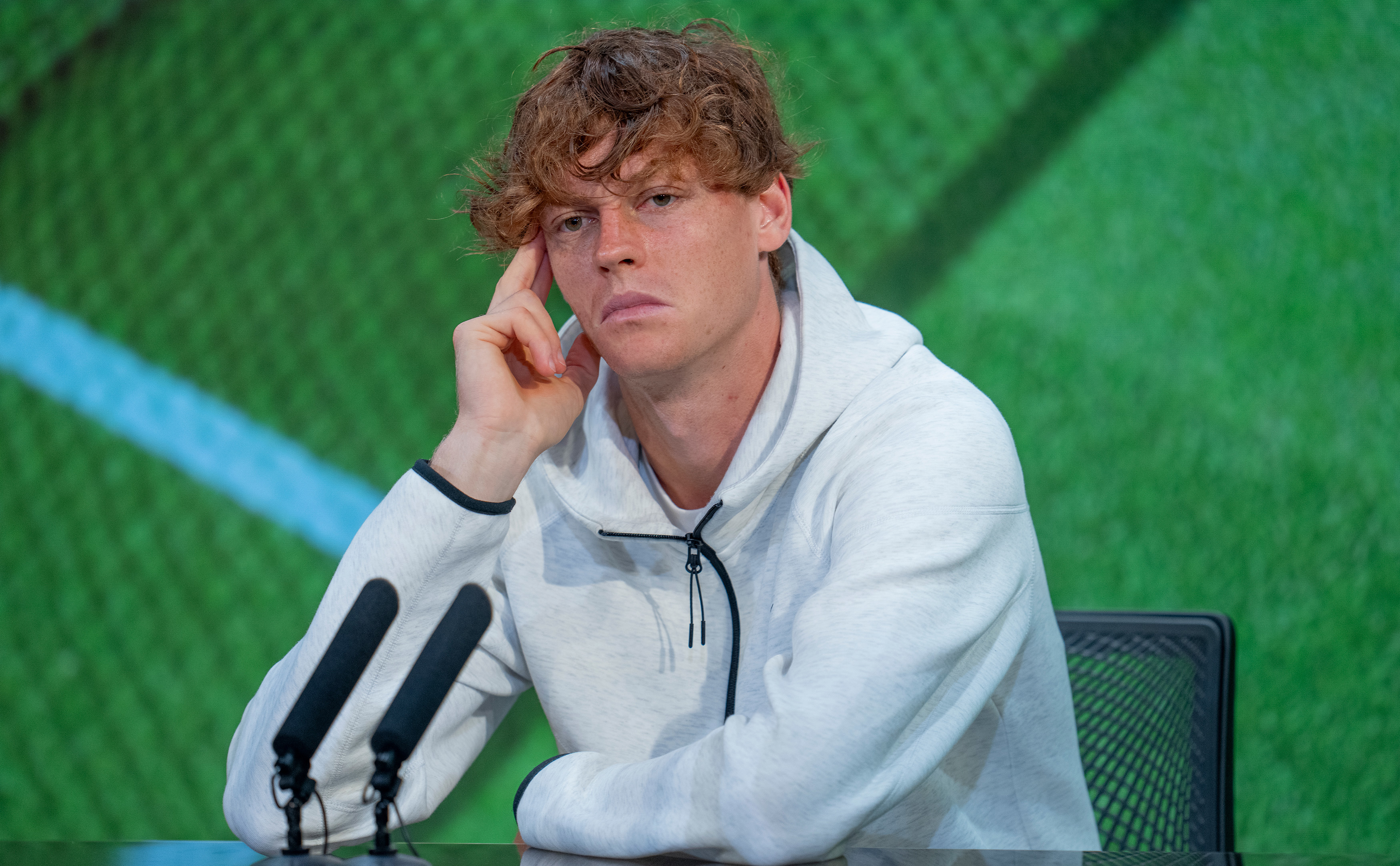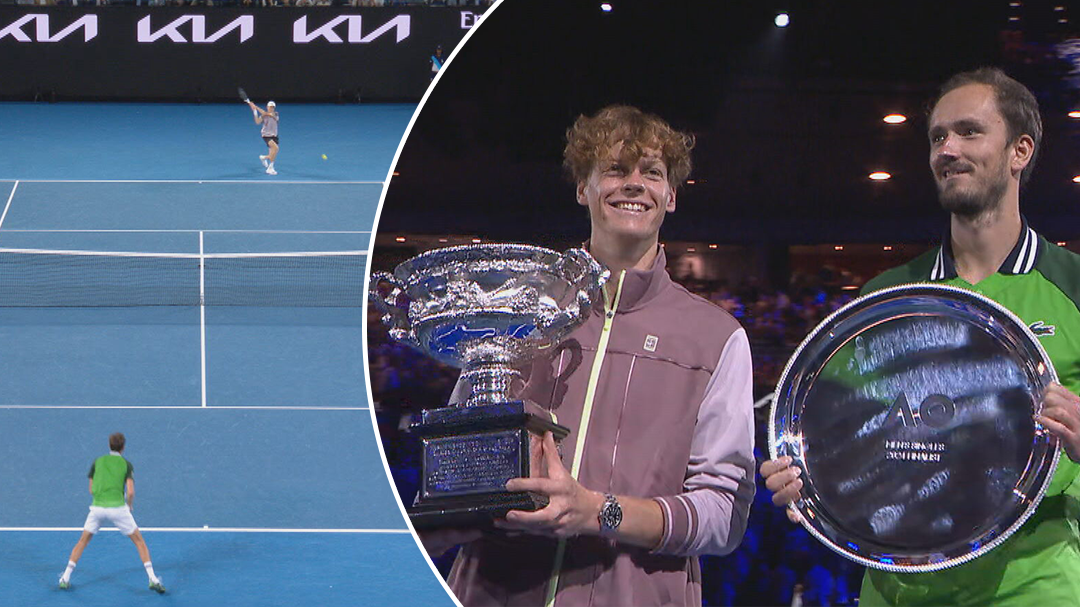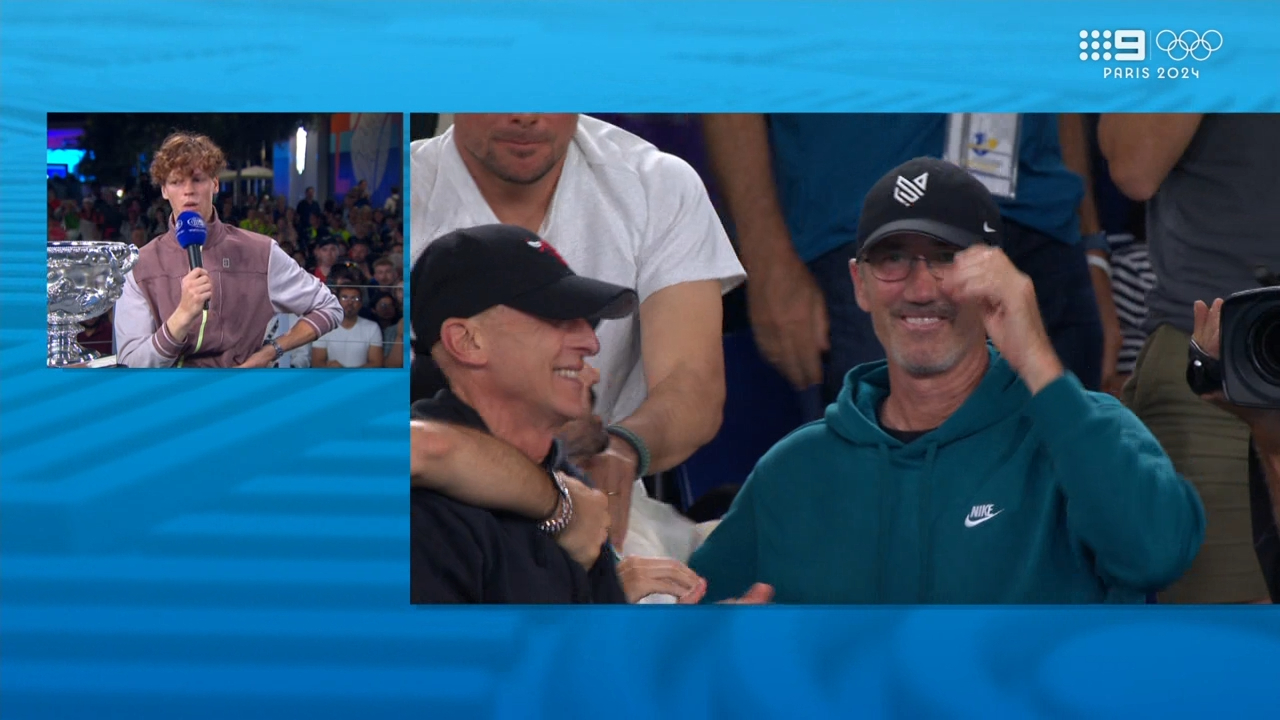
Jannik Sinner's positive tests has divided the tennis world with the Italian facing backlash from fellow players as he continues his preparations for the US Open.
Sinner's inclusion in the final grand slam of the year has left some players infuriated after he tested positive twice in March for a banned anabolic steroid.
The Italian tested positive clostebol, an anabolic steroid that can be found in ointments and sprays sold over-the-counter in some countries, such as Italy, and used to treat cuts or scrapes.
READ MORE: Emotional Coote joins rugby league's most exclusive club
READ MORE: How a $20 bet became rugby league folklore
READ MORE: Smith's emotional Hall of Fame tribute to late mother
It's a case that no one knew about until Wednesday and one that has drawn all sorts of questions — and, in some instances, criticism — from other players who wonder whether there was a double standard at play because of Sinner's success.
Most of the players on tour are confused about why it was all kept under wraps, and want to know why Sinner was allowed to keep competing before there was a resolution.

“I will now put this challenging and deeply unfortunate period behind me,” Sinner said in a statement posted on social media.
“I will continue to do everything I can to ensure I continue to comply with the (sport's) anti-doping (program) and I have a team around me that are meticulous in their own compliance.”
Not everyone is completely ready to just move forward. And it will be interesting to see how much scrutiny Sinner receives — from other athletes, from spectators, from the media — during the US Open, where he will be the top-seeded man.
“Different rules for different players,” 2021 Wimbledon semi finalist Denis Shapovalov wrote on social media.
Clostebol is considered a performance enhancer, and several athletes in various sports have been suspended after testing positive; including Major League Baseball star Fernando Tatis Jr, who received an 80-game ban in 2022.
Sinner submitted a urine sample that showed traces of the steroid during the Indian Wells tournament in California in March; an out-of-competition sample eight days later also tested positive.
"Ridiculous - whether it was accidental or planned. You get tested twice with a banned substance ... you should be gone for 2 years. Your performance was enhanced," Nick Kyrgios said on X.

Fellow Australian John Millman was of a different view and defended the Italian. Millman said the International Tennis Federation handled this situation better than previous cases referencing Simona Halep's recent doping saga.
Millman said according to the findings Sinner should not face a ban, rather the testing regime needs a rethink.
"Before jumping to conclusions, Jannik Sinner had less than a billionth of a gram in his system.. I believe him .. maybe we should change threshold cater for contamination," he wrote on social media.
Sinner moved up to No.1 in the ATP rankings for the first time in June and is considered one of the leaders of the next group of male tennis stars who will succeed the Big Three of Roger Federer, Rafael Nadal and Novak Djokovic.
Sinner's first grand slam trophy came in January at the Australian Open, where he eliminated Novak Djokovic in the semi-finals before erasing a two-set deficit in the final to beat Daniil Medvedev.

He is 48-5 with a tour-leading five titles; his most recent championship came at the Cincinnati Open this week.
He was provisionally suspended for the two positive results, but he appealed those bans, saying that he inadvertently was exposed to the steroid. He argued that one member of his team purchased a spray that contained Clostebol in Italy, then gave it to another team member — a physiotherapist — who cut a finger. Sinner said the physiotherapist then gave him a massage, which transmitted the substance to Sinner.
The International Tennis Integrity Agency (ITIA), which handles anti-doping and anti-corruption investigations for the sport, accepted his explanation, as did an independent tribunal, which said Sinner was not negligent and not at fault.
"He's not guilty," former doubles champion Todd Woodbridge told 9News. "He's been proven innocent by a board of two independents who have both said there was not enough substance in his body to enhance his performance with the substance being less than a billionth of a gram.
"You have to take your time and read through the manuscripts and then you see the due diligence has been done."
Sinner had to forfeit over $480,000 in prize money and 400 ranking points he earned by getting to the semi-finals at Indian Wells.

Tennys Sandgren, a two-time quarter finalist at the Australian Open, said Sinner’s explanation for how the steroid got into his system “does seem pretty plausible,” but added that “how this was handled really doesn’t seem fair compared to other players whatsoever.”
There also were those who noted that Jenson Brooksby and Mikael Ymer both were suspended for missing tests.
“I do think that they protect top players. By ‘protecting’ — they’re going to keep the secret for a couple months.
"They’re going to keep certain things secret if you’re a top player, because they don’t want the press, the player doesn’t want the press."
"It’s all going to come out in three months, anyway,” said Chris Evert, an 18-time grand slam champion who is now an ESPN analyst. “I do think there’s some protection there, (more) than if you were Joe Smith, ranked 400 in the world.”
Jannik Sinner's positive tests has divided the tennis world with the Italian facing backlash from fellow players as he continues his preparations for the US Open.
Sinner's inclusion in the final grand slam of the year has left some players infuriated after he tested positive twice in March for a banned anabolic steroid.
The Italian tested positive clostebol, an anabolic steroid that can be found in ointments and sprays sold over-the-counter in some countries, such as Italy, and used to treat cuts or scrapes.
READ MORE: Emotional Coote joins rugby league's most exclusive club
READ MORE: How a $20 bet became rugby league folklore
READ MORE: Smith's emotional Hall of Fame tribute to late mother
It's a case that no one knew about until Wednesday and one that has drawn all sorts of questions — and, in some instances, criticism — from other players who wonder whether there was a double standard at play because of Sinner's success.
Most of the players on tour are confused about why it was all kept under wraps, and want to know why Sinner was allowed to keep competing before there was a resolution.

“I will now put this challenging and deeply unfortunate period behind me,” Sinner said in a statement posted on social media.
“I will continue to do everything I can to ensure I continue to comply with the (sport's) anti-doping (program) and I have a team around me that are meticulous in their own compliance.”
Not everyone is completely ready to just move forward. And it will be interesting to see how much scrutiny Sinner receives — from other athletes, from spectators, from the media — during the US Open, where he will be the top-seeded man.
“Different rules for different players,” 2021 Wimbledon semi finalist Denis Shapovalov wrote on social media.
Clostebol is considered a performance enhancer, and several athletes in various sports have been suspended after testing positive; including Major League Baseball star Fernando Tatis Jr, who received an 80-game ban in 2022.
Sinner submitted a urine sample that showed traces of the steroid during the Indian Wells tournament in California in March; an out-of-competition sample eight days later also tested positive.
"Ridiculous - whether it was accidental or planned. You get tested twice with a banned substance ... you should be gone for 2 years. Your performance was enhanced," Nick Kyrgios said on X.

Fellow Australian John Millman was of a different view and defended the Italian. Millman said the International Tennis Federation handled this situation better than previous cases referencing Simona Halep's recent doping saga.
Millman said according to the findings Sinner should not face a ban, rather the testing regime needs a rethink.
"Before jumping to conclusions, Jannik Sinner had less than a billionth of a gram in his system.. I believe him .. maybe we should change threshold cater for contamination," he wrote on social media.
Sinner moved up to No.1 in the ATP rankings for the first time in June and is considered one of the leaders of the next group of male tennis stars who will succeed the Big Three of Roger Federer, Rafael Nadal and Novak Djokovic.
Sinner's first grand slam trophy came in January at the Australian Open, where he eliminated Novak Djokovic in the semi-finals before erasing a two-set deficit in the final to beat Daniil Medvedev.

He is 48-5 with a tour-leading five titles; his most recent championship came at the Cincinnati Open this week.
He was provisionally suspended for the two positive results, but he appealed those bans, saying that he inadvertently was exposed to the steroid. He argued that one member of his team purchased a spray that contained Clostebol in Italy, then gave it to another team member — a physiotherapist — who cut a finger. Sinner said the physiotherapist then gave him a massage, which transmitted the substance to Sinner.
The International Tennis Integrity Agency (ITIA), which handles anti-doping and anti-corruption investigations for the sport, accepted his explanation, as did an independent tribunal, which said Sinner was not negligent and not at fault.
"He's not guilty," former doubles champion Todd Woodbridge told 9News. "He's been proven innocent by a board of two independents who have both said there was not enough substance in his body to enhance his performance with the substance being less than a billionth of a gram.
"You have to take your time and read through the manuscripts and then you see the due diligence has been done."
Sinner had to forfeit over $480,000 in prize money and 400 ranking points he earned by getting to the semi-finals at Indian Wells.

Tennys Sandgren, a two-time quarter finalist at the Australian Open, said Sinner’s explanation for how the steroid got into his system “does seem pretty plausible,” but added that “how this was handled really doesn’t seem fair compared to other players whatsoever.”
There also were those who noted that Jenson Brooksby and Mikael Ymer both were suspended for missing tests.
“I do think that they protect top players. By ‘protecting’ — they’re going to keep the secret for a couple months.
"They’re going to keep certain things secret if you’re a top player, because they don’t want the press, the player doesn’t want the press."
"It’s all going to come out in three months, anyway,” said Chris Evert, an 18-time grand slam champion who is now an ESPN analyst. “I do think there’s some protection there, (more) than if you were Joe Smith, ranked 400 in the world.”
https://ift.tt/FuGNIoV//

No comments:
Post a Comment